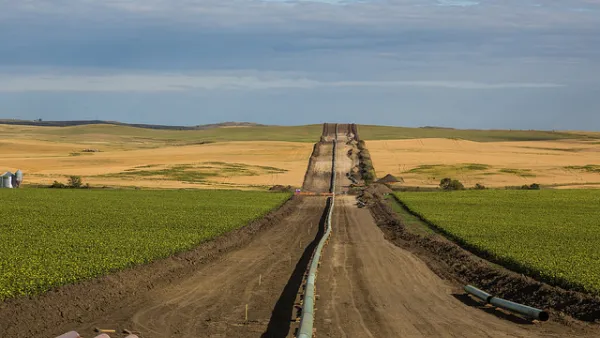While regulated on the federal level, there is still much that can be done on a state level, including adding per-barrel fees to pay for cleanup plans. Plus, a new regulation took effect requiring railroads to notify states about Bakken crude trains.
- As part of his annual budget, Gov. (Jerry) Brown wants to expand an existing prevention-and-response program for ocean oil spills to cover inland areas.The initiative would be funded by a proposed 6.5-cent-per-barrel fee on all crude oil delivered by rail to refineries. Additionally, Brown is asking lawmakers to approve hiring new track inspectors.
- Separately, state Sen. Fran Pavley (D-Agoura Hills) last week steered a similar spill-response measure, SB 1319 (May 28 legislative analysis), through the state Senate, winning approval on a 23-11 vote. [See her May 28 press release.]
- In the lower house, Assemblyman Roger Dickinson (D-Sacramento) recently amended a bill that would require railroads to report to the state Office of Emergency Services information about hazardous materials, including crude oil, being transported into the state.
- His proposal, AB 380 (June 2 legislative analysis), which was unanimously approved by the Senate Environmental Quality Committee on Wednesday,also would require rail carriers to maintain live, 24-hour communications lines that would enable local first-responders to contact them. [See his June 4 press release.]
An emergency regulation issued last month previously took effect on Saturday, June 7 requiring "railroads to notify states of the specific routes they will use when transporting more than 1 million barrels of Bakken crude. Such oil "may be more flammable than traditional heavy crude," the U.S. Department of Transportation warned," writes Lifsher [also see KQED blog.]
However, Valero Energy spokesman Chris Howe appeared to dispute the regulator's warning.
"There is nothing inherently more dangerous about one crude than another. They are all flammable," he told Tony Bizjak of The Sacramento Bee.
It should be noted that when talking of increased crude-by-rail shipments to California, it's important to distinguish types of crude. The oil sands crude from Alberta does not pose the public safety threat that the higher volatility Bakken crude presents.
FULL STORY: State is moving to prevent spills of oil shipped by trains

National Parks Layoffs Will Cause Communities to Lose Billions
Thousands of essential park workers were laid off this week, just before the busy spring break season.

Retro-silient?: America’s First “Eco-burb,” The Woodlands Turns 50
A master-planned community north of Houston offers lessons on green infrastructure and resilient design, but falls short of its founder’s lofty affordability and walkability goals.

Delivering for America Plan Will Downgrade Mail Service in at Least 49.5 Percent of Zip Codes
Republican and Democrat lawmakers criticize the plan for its disproportionate negative impact on rural communities.

Test News Post 1
This is a summary

Test News Headline 46
Test for the image on the front page.

Balancing Bombs and Butterflies: How the National Guard Protects a Rare Species
The National Guard at Fort Indiantown Gap uses GIS technology and land management strategies to balance military training with conservation efforts, ensuring the survival of the rare eastern regal fritillary butterfly.
Urban Design for Planners 1: Software Tools
This six-course series explores essential urban design concepts using open source software and equips planners with the tools they need to participate fully in the urban design process.
Planning for Universal Design
Learn the tools for implementing Universal Design in planning regulations.
EMC Planning Group, Inc.
Planetizen
Planetizen
Mpact (formerly Rail~Volution)
Great Falls Development Authority, Inc.
HUDs Office of Policy Development and Research
NYU Wagner Graduate School of Public Service





























